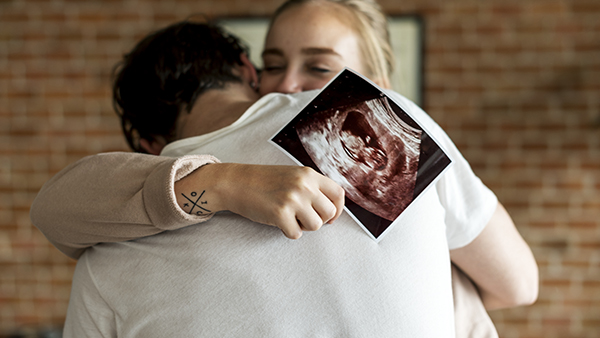How do you become pregnant?
Check your calendar, know when you ovulate, make sure the atmosphere is right...How do you really get pregnant? Does it have to be so complicated or is having sex enough? We're talking about fertility and how to become pregnant.
Read time: 3 m
Verified by Jenny Jansson
Certified midwife
It takes most women a year to become pregnant. If you're trying to have a baby the general advice is to have sex a couple of times a week. It's less stressful and you'll feel less pressure when you don't have to constantly think about where you are in your cycle. Around eight out of ten women who have regular sex become pregnant within twelve months. Sex around ovulation increases the likelihood of fertilization. It can be hard to know when ovulation will occur.
When ovulation occurs a mature egg is released from your ovaries and travels down your Fallopian tubes. This happens once a month, about two weeks before your period. The egg can be fertilized by a sperm. Once an egg has left the ovary, it needs to be fertilized by a sperm within 24 hours. Sperm can survive in the Fallopian tubes for around five days while waiting for an egg.
Fertilisation
When an egg and a sperm combine, an embryo begins to form, which is called fertilization. The embryo then develops in the mother's womb into a fetus, which then becomes a child when it is born.
Sperm collects in the testicles. When the man ejaculates, semen comes out of the penis - a mixture of sperm and various fluids from the seminal vesicles and prostate gland. When the penis ejaculates, the sperm swim into the vagina, a few millimeters per minute, through the uterus and into the Fallopian tubes. There are millions of sperm in an ejaculation, but in the end, only a single sperm can enter the egg and fertilize it.
When the egg is fertilized the cells immediately begin to divide. They multiply until they become a small clump of cells. The cell clump continues to move through the Fallopian tube to the uterus and gets stuck in the uterine lining about a week after conception, where part of the cell clump attaches to the uterine wall. The part of the cell clump that attaches there will develop into the placenta, which nourishes the fetus in the womb. The other part of the cell clump is called the embryo. These are the cells that will soon be a baby. Both the egg and the sperm contain a genetic predisposition and it is the sperm's genetic predisposition that determines which biological sex your child will be.
Twins
Twins happen when two eggs mature and loosen at the same time. If both eggs are fertilized dizygotic twins develop. If a fertilized egg splits and two embryos develop monozygotic twins develop. Very rarely does an egg/or eggs divides into three embryos and triplets develop.
Alternative fertilisation
If fertilization doesn't work with vaginal sex it can work with insemination. This means that sperm is injected into the uterus using a syringe and a plastic tube.
Fertilization can also be carried out using IVF (In vitro-fertilization). Mature eggs are harvested from the ovaries and fertilized by sperm outside the body. Then the fertilized egg is inserted back into the body.
Verified by Jenny Jansson
Certified midwife
More from Preggers
Hundreds of related articles, podcasts & more waiting for you in the Preggers app.
Download Preggers today.

